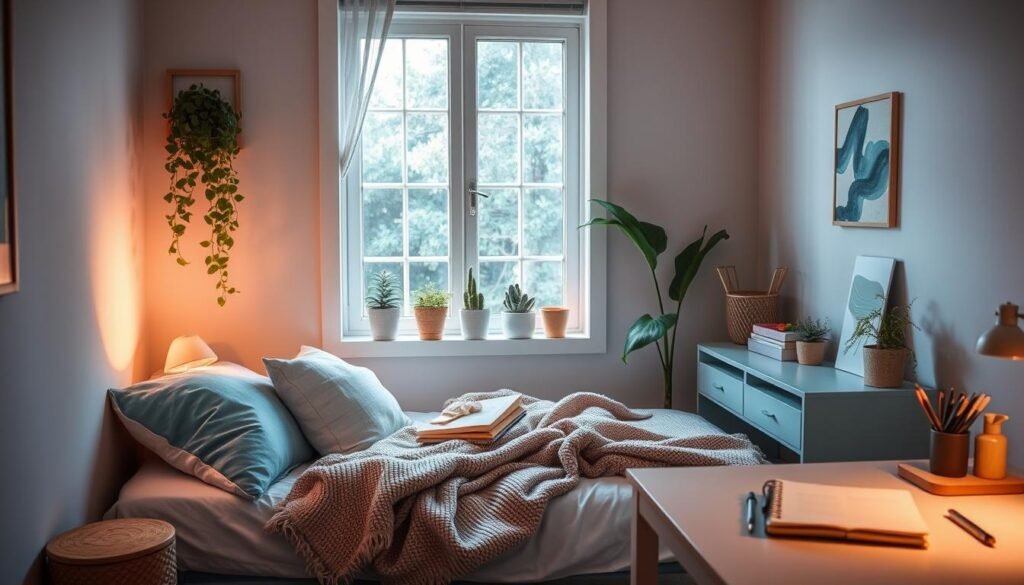About 32% of teens in the U.S. are dealing with anxiety disorders. It’s crucial to help these adolescents. Their academic and social lives, plus overall happiness, can suffer without support. Luckily, there are many treatment options designed specifically for teens. These treatments help them regain control of their mental health. The sooner we step in, the better, as early action helps avoid long-term problems from anxiety.
Key Takeaways
- 32% of U.S. adolescents experience anxiety disorders.
- Effective therapies for teens can lead to improved mental well-being.
- Early intervention is crucial to prevent long-term complications.
- Evidence-based techniques, such as Cognitive Behavioral Therapy, are utilized.
- Convenient therapy options include evening and weekend appointments.
- Access to therapy services is available in Palo Alto, Menlo Park, and San Jose.
Understanding Teenage Anxiety
Teenage anxiety is a big hurdle that shows up in different ways. It’s important for parents and educators to recognize teenage anxiety symptoms. This helps give the right support. Anxiety disorders are quite common in the youth, affecting about 8% of kids and teens. The symptoms can be quite varied. They show the emotional state and the special pressures teenagers face.
Common Symptoms of Anxiety in Teens
Teenagers show many signs linked to their anxiety. Some usual symptoms are:
- Excessive worry about academic performance
- Concerns regarding social acceptance and body image
- Irritability and mood swings
- Withdrawal from friends and social events
- Physical issues such as headaches or gastrointestinal problems
These various signs can cause big problems in school and social life. Recognizing them helps tackle the root problems better. For more info on how to manage these signs, check this helpful resource.
Differences Between Anxiety in Children and Adolescents
The adolescent anxiety defining characteristics are different from those in younger kids. Children might show clinginess or tantrums. Teens tend to show their anxiety differently through:
- Self-doubt and a fear of judgment
- Avoidance of social engagements and eye contact
- Increased focus on identity and peer relationships
As teens deal with hormone changes and social pressures, their anxiety can get worse. Knowing these differences helps find the right help and support for their specific needs.
Causes of Anxiety in Teens
The reasons teens feel anxious can be complicated. They come from both how they were born and the world around them. Knowing what causes this anxiety can help us understand their struggles better.
Many things like stress and genes play a big role. These factors often start anxiety disorders when kids are growing up.
Environmental Factors Contributing to Anxiety
Where teens live and what they experience matters a lot. Big life changes, like moving or family issues, can start anxiety problems. Things like being bullied, facing abuse, or parents getting divorced can make teens feel very unsafe and scared.
Also, social media today makes it hard for them to feel good about themselves. It can make their mental health worse, leading to more anxiety.
Biological Influences on Teen Anxiety
Teens’ bodies and brains affect their anxiety, too. If their family has had mood or anxiety issues, they might face them as well. As teens grow, their brains change in ways that can make stress harder to handle.
Their bodies go through a lot of changes too, like puberty. This can change how they feel and how stressed they are. Biology and environment together make a complex mix that affects teen anxiety. For more details, check out this resource.
The Impact of COVID-19 on Teen Anxiety
The COVID-19 pandemic deeply affected many teenagers’ feelings. The COVID-19 impact on teen anxiety is huge. Teens felt isolated and their normal lives were disrupted. This led to more anxiety and depression. Such a shift in mental health is worrying, mainly for teens in tough situations.
Increased Isolation and Its Effect on Mental Health
Staying at home for a long time made the isolation effects on adolescents clear. Less in-person time with friends made loneliness and anxiety worse. Studies show a big jump in teen depression and anxiety—from 5.4% in 2003 to 20% by 2021. For those already dealing with mental health issues, the pandemic made things harder (Jones et al., 2021).
Disruption of Normal Routines
COVID-19 changed everyday life for teens, hurting their mental well-being. School changes and missing activities increased stress over grades and friendships. Adapting was tough. But, getting help through counseling and online health services is key. This support is vital now, as more teens need help for their anxiety (Hawes et al., 2021; CBT techniques might ease anxiety).
Teenage Anxiety Treatment: An Overview
Understanding how to treat anxiety in teens is vital. Anxiety disorders are on the rise, especially in tough times. Knowing about effective treatments can make a big difference. Here we look at professional help and why it’s important to act fast.
Types of Professional Help Available
There are many anxiety treatment options for teens. Each one can be tailored to fit a teen’s specific needs. The main types are:
- Cognitive Behavioral Therapy (CBT): This therapy changes negative thoughts that cause anxiety.
- Counseling: School counselors and therapists offer support in a safe setting.
- Medication Management: Medicines like SSRIs are given with therapy to reduce anxiety.
- Family Therapy: Involving the family helps provide a support system for tackling anxiety.
Importance of Early Intervention
Early intervention is key for a teen’s mental health. Dealing with anxiety early improves coping skills and helps avoid bigger issues. If not treated, anxiety can harm school performance and lead to less social interaction. Early help sets teens on a healthier path, building their resilience against anxiety.

| Treatment Type | Description | Benefits |
|---|---|---|
| Cognitive Behavioral Therapy (CBT) | A therapy aimed at changing harmful thought patterns. | It helps identify what triggers anxiety and how to cope with it. |
| Medication Management | It’s about using SSRIs to lessen anxiety symptoms. | This reduces anxiety’s impact and helps improve daily activities. |
| School Counseling | Help from trained school professionals. | Provides a confidential place to talk and get advice. |
| Family Therapy | This treatment involves family in planning and discussions. | It helps create a supportive environment at home for the teen. |
Therapeutic Approaches to Managing Teenage Anxiety
Teenagers dealing with anxiety can tap into several helpful therapies. Each one brings unique methods. They help teens tackle their anxiety and become stronger.
Cognitive Behavioral Therapy (CBT)
CBT is a focused therapy for teens with anxiety. It helps change negative thought patterns. In sessions, teens see how thoughts affect feelings and actions. This therapy gives teens ways to deal with stressful situations.
Adolescent Anxiety Counseling Techniques
Counselors use varied techniques to help teens talk about their fears. Methods like mindfulness and acceptance therapy aid understanding and acceptance. Teens learn to act based on their values. These techniques build resilience, making anxiety less daunting for them.
Benefits of Group Therapy for Teens
Group therapy is a boon for anxious teens. It’s a safe space to meet others who get it. Sharing stories and tips helps lessen loneliness and boosts coping skills.
Medication Options for Treating Anxiety
Treating anxiety in teens often involves assessing their specific needs. Medication is key in managing symptoms, especially when paired with therapy. Knowing about common medications and working closely with healthcare providers boosts treatment effectiveness.
Common Medications Prescribed for Teens
Antidepressants are the most prescribed anxiety medication for teens. Selective serotonin reuptake inhibitors (SSRIs) and serotonin-norepinephrine reuptake inhibitors (SNRIs) offer a good mix of effectiveness and mild side effects. Here are some important facts about them:
- SSRIs and SNRIs usually start to reduce anxiety in 2 to 4 weeks, with full effects in 8 to 12 weeks.
- Side effects like nausea, headaches, and dizziness often lessen over time.
- For acute anxiety, benzodiazepines may be used carefully due to long-term effectiveness concerns.
- In certain cases, other medications such as atypical antipsychotics and alpha agonists might be considered.
Working With Healthcare Providers
Success in treatment depends on good healthcare provider collaboration. Including family in discussions helps with better outcomes and sticking to the treatment plan. Regular check-ins allow for tracking progress and adjusting medications when needed. Open communication is vital for managing any new side effects. Here are some collaboration tips:
- Keep regular appointments to check treatment effectiveness.
- Talk about the teen’s reaction to medication and any side effects.
- Consider combining medication with therapy, like cognitive behavioral therapy (CBT), for better results.

Teen Mental Health Support Resources
Finding the right support can really help teens deal with anxiety. Many resources are here to help students and their families. Schools offer counseling services that are very helpful. They create a safe space for students to talk about their worries and get advice.
School Counseling Services
Schools have counselors who know how to help students facing mental health challenges. They connect students with the support they need. Students can talk to counselors and learn about other resources too. This way, the whole family can find the help they need through the school.
Online Resources and Hotlines
There are online resources and hotlines just for teens too. The National Alliance on Mental Illness (NAMI) provides important info and help. The Substance Abuse and Mental Health Services Administration (SAMHSA) also offers help and crisis services. These services are very important. They make sure counseling is easily reachable for teens and their families. For more details, visit this resource.
| Type of Resource | Description | Examples |
|---|---|---|
| School Counseling Services | On-campus support from trained counselors. | Crisis intervention, educational support |
| Online Resources | Web-based support for mental health awareness. | NAMI, SAMHSA |
| Crisis Hotlines | 24/7 access to trained professionals for immediate help. | National Suicide Prevention Lifeline |
Healthy Coping Strategies for Teens
Anxiety often visits teens as they face the ups and downs of growing up. It’s crucial to have good self-help options. These methods help teens deal with school stress, friendships, and more. They learn to find peace and control in their lives.
Teen Anxiety Self-Help Methods
Building tools for managing anxiety helps teens recognize what triggers their worry. Using journaling, mindfulness practices, and setting realistic goals can really make a difference. They can stop negative thoughts like:
- All-or-nothing thinking
- Personalizing situations
- Catastrophizing fears
Moving from a fixed mindset to a growth mindset helps teens fight these harmful beliefs. Techniques like the 5-4-3-2-1 method keep them focused when anxiety spikes. Positive self-talk also helps change how they think.
Relaxation Techniques to Reduce Stress
Relaxation methods are key to easing anxiety symptoms. Practices like deep breathing exercises, yoga, and meditation have proven helpful. These activities reduce muscle tension and rapid heartbeats. Doing them regularly makes teens more emotionally aware and better at handling stress.

Learning to fit these practices into daily life dramatically changes how teens manage anxiety. Feeling less stressed improves their emotional control. This lets them handle everyday challenges more smoothly.
| Coping Strategy | Benefits |
|---|---|
| Journaling | Increases self-reflection, identifies triggers |
| Mindfulness | Enhances emotional regulation and awareness |
| Deep Breathing | Reduces physical symptoms of anxiety |
| Positive Self-Talk | Reframes negative thoughts |
| Grounding Exercises | Helps refocus attention in stressful moments |
Teen Stress and Anxiety Relief Techniques
Teenagers today are up against many challenges that cause stress. It’s key to have anxiety relief techniques for teens ready to help them. Things like exercise, using social media wisely, and making good friends are really important for managing stress and anxiety.
Physical Activity and Its Role in Anxiety Relief
Being active is great for fighting anxiety. Studies show that more than half of teens feel better when they stay active. Exercise doesn’t just make you feel good physically. It also gives you a way to handle your feelings and take your mind off worries. Joining a sports team or just going for walks every day can make a big difference in your mood.
Social Media’s Impact on Teen Anxiety
Social media can be a mixed bag. It lets you connect with others but also brings big social media issues like anxiety. Teens often feel worse because of online comparisons, cyberbullying, and fake lifestyles. Learning to use these platforms in a smart way is key. It can cut down on the stress that comes from online life.
The Importance of Building Social Connections
Having good friends is like a shield against anxiety. Encouraging teens to have strong friendships is very important. Peer support groups are a great way to feel less alone. Spending time with friends who understand can help you deal with stress better. This is crucial for teenagers who are learning how to face life’s challenges.
| Technique | Description | Benefits |
|---|---|---|
| Physical Activity | Regular structured exercise such as sports or dance. | Reduces anxiety, improves mood, and increases resilience. |
| Social Media Management | Avoiding negative comparisons; mindful social media use. | Greater emotional balance and reduced anxiety triggers. |
| Building Connections | Participating in peer support groups or engaging with friends. | Emotional support and shared experiences decrease isolation. |
Conclusion
Understanding teenage anxiety is key to creating a supportive world. An estimated 31% of adolescents battle with anxiety. However, only 18% get the help they need. This gap shows we must do more.
Parents, teachers, and doctors need to work together to help these teens. They can offer early help and treatments like cognitive behavioral therapy. This could ease anxiety’s impact on school work and friendships. Without support, anxiety can lead to bigger issues like depression.
To wrap up, giving teens the mental health support they need can change lives. Anxiety is a serious issue, not just a phase. Effective treatment can build strong, happy young people. By working together, we can create a positive change.